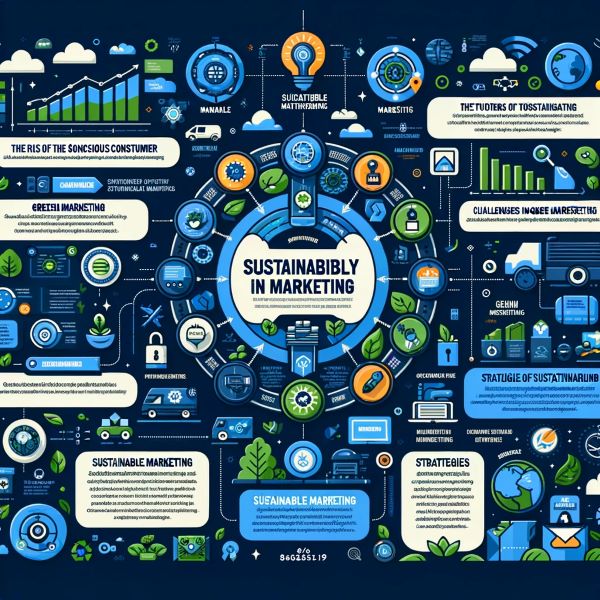“Sustainability in Marketing: How Green Brands Are Shaping the Future”
3 min read
xr:d:DAGBYjm3vao:23,j:8473946432189065571,t:24040318
“Sustainability in Marketing: How Green Brands Are Shaping the Future”

In a world increasingly aware of the environmental impact of its choices, sustainability in marketing is no longer an option but a necessity. This post explores how the integration of sustainable practices is not only transforming marketing, but also redefining success for brands in today’s marketplace.
The Rise of the Conscious Consumer
The era of the conscious consumer has arrived. Research indicates that a significant percentage of consumers prefer brands that demonstrate concern about the environmental impact of their products and practices. This new consumer profile values transparency, ethics and corporate social responsibility, directly influencing purchasing decisions. Therefore, it becomes crucial for brands to incorporate sustainability into their marketing strategies to meet these expectations.
Sustainable Marketing Strategies
Authenticity is Key
Consumers are increasingly informed and can easily distinguish between genuine marketing and greenwashing. Therefore, brands must ensure that their sustainable actions are authentic and well communicated.
Transparency
Providing clear information about the origin of products, sustainable manufacturing processes and environmental impact demonstrates responsibility and builds trust with the public.
Consumer Involvement
Creating campaigns that encourage consumer participation in sustainable initiatives can increase engagement and brand loyalty. Whether through recycling programs, reusable products or encouraging sustainable behaviors, direct involvement is effective.
Partnerships and Certifications
Aligning with environmental organizations and obtaining sustainable certifications can strengthen a brand’s credibility and highlight its commitment to green practices.
Challenges of Sustainable Marketing
Despite the many benefits, sustainable marketing comes with its set of challenges. The initial cost of implementing sustainable practices can be high, and the balance between maintaining profitability and investing in sustainability can be delicate. Additionally, there is the risk of greenwashing, where companies can be accused of making false or misleading environmental claims to gain favor with consumers.
Success Stories in Green Marketing
Companies like Patagonia and Ben & Jerry’s have been pioneers in integrating sustainability into their marketing strategies. Patagonia, for example, is known for its “no buy” policy, encouraging consumers to repair clothes rather than buy new ones. These brands demonstrate that it is possible to be profitable while doing good for the planet.
The Future of Sustainable Marketing
The future of sustainable marketing is promising. With technology advancing rapidly, new opportunities arise to reduce the environmental impact of marketing and engage consumers in innovative ways. Sustainability has gone from being a trend to becoming a central pillar in the marketing strategies of successful brands.
Sustainability in marketing is more than a strategy; It is a necessity for companies that want to thrive in an increasingly environmentally conscious world. By adopting sustainable practices, brands not only contribute to a greener future, but also connect with consumers in a more meaningful way, building loyalty that goes beyond the product.
Authenticity and Genuine Commitment
In an era of increasing consumer scrutiny, authenticity in sustainable marketing practices has never been more crucial. Brands that demonstrate a genuine commitment to sustainability, not just in their marketing campaigns but across all operations, earn the trust and respect of consumers. The key to authentic sustainable marketing lies in the consistency of the brand’s actions with its proclaimed values. This means investing in long-term solutions, such as renewable energy, sustainable supply chains and community initiatives, that reflect a true commitment to the environment and society.
Technological Innovation at the Vanguard of Sustainability
Technological innovation plays a vital role in enabling more sustainable marketing practices. From advanced analytics to optimize campaign efficiency to developing new sustainable packaging materials, technology is at the forefront of green transformation. Augmented and virtual reality tools, for example, offer innovative ways to engage consumers without the need for physical materials, thus reducing waste. Furthermore, artificial intelligence can be used to personalize offers, minimizing excess production and adjusting precisely to consumer needs, promoting a more circular economy.
Do you want to transform your marketing strategy and lead with sustainability?
Start making a difference today. Contact us to find out how we can help your brand be greener.
Get to know us






